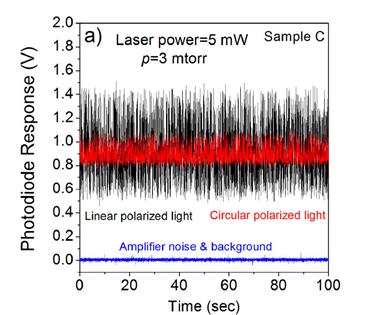The Amazing Physics of Spinning Graphene
Graphene is one of the more extraordinary materials discovered in the last few years. This carbon chicken wire has properties that make it a superhero in the materials world. It is a superb thermal and electrical conductor, it has a high melting point and it is stronger than almost any other known substance.

And yet measuring these properties is tricky because graphene flakes inevitably have to sit on some kind of substrate and this interferes with the results.
What to do? Now Bruce Kane at the University of Maryland makes the case for suspending charged flakes of graphene in an electric field ion trap. That allows the graphene to sit in a vacuum while it is prodded and poked in whatever way physicists can think of and without the interfering effect of any substrate.
Kane has even achieved this feat by injecting flakes suspended in liquid into a quadropole electric field vacuum.
By shining polarised light on the flakes he can make them spin and accurately measure their rate of rotation.
This suggests some interesting experiments. Kane says that spinning them fast enough would test the strength of the flakes as centrifugal forces tear them apart. That will require rotation rates measured in GHz, much faster than the MHz rates he has been able to measure so far.
It should also be possible to measure a flake’s chemical and physical properties at high temperature. These measurements are difficult when the flake rests on a surface that has a different properties. “Very little is known about the melting of graphene or how defects will behave at high temperatures,” points out Kane.
Another possibility is to cool the flakes to their mechanical ground state and use them as spinning qubits.
That’ll be interesting. Is there anything this wonder material cannot do?
Ref: arxiv.org/abs/1006.3774: Levitated Spinning Graphene
Keep Reading
Most Popular
Large language models can do jaw-dropping things. But nobody knows exactly why.
And that's a problem. Figuring it out is one of the biggest scientific puzzles of our time and a crucial step towards controlling more powerful future models.
The problem with plug-in hybrids? Their drivers.
Plug-in hybrids are often sold as a transition to EVs, but new data from Europe shows we’re still underestimating the emissions they produce.
Google DeepMind’s new generative model makes Super Mario–like games from scratch
Genie learns how to control games by watching hours and hours of video. It could help train next-gen robots too.
How scientists traced a mysterious covid case back to six toilets
When wastewater surveillance turns into a hunt for a single infected individual, the ethics get tricky.
Stay connected
Get the latest updates from
MIT Technology Review
Discover special offers, top stories, upcoming events, and more.